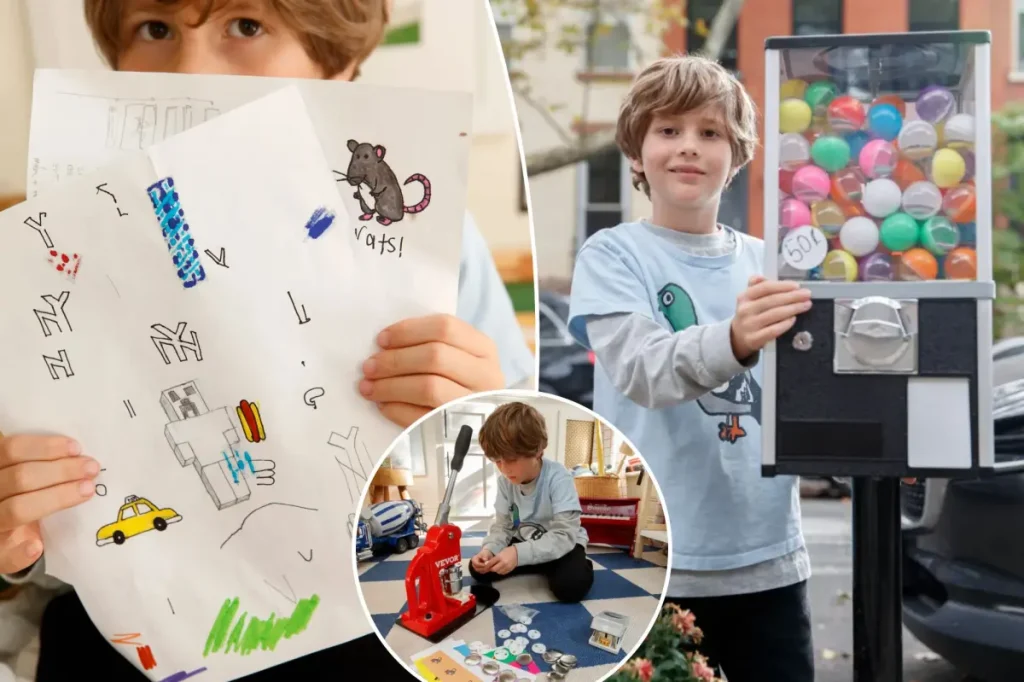From Gumball Dispenser to Sidewalk Sensation: The 8-Year-Old Button Entrepreneur of Brooklyn
Meet Linus Piepmeyer, the 8-year-old “vending machine king” of Brooklyn who’s turning his artistic talents into a thriving mini-business before he’s even completed third grade. What began as his parents’ creative lesson about money and savings has blossomed into a beloved neighborhood attraction in Boerum Hill. Since July, Linus has been selling homemade, New York-themed buttons through a gumball dispenser stationed outside his family’s brownstone home. His colorful designs—featuring quintessential NYC icons like pigeons, pizza slices, taxis, hot dogs, and even rats—are dispensed in bright plastic capsules for 50 cents each. The young entrepreneur has sold hundreds of pins, filling his piggy bank with quarters and warming the hearts of neighbors and passersby alike. “Getting the money has been cool,” Linus admits, though he initially hoped the machine might dispense snacks like Cheetos or Twizzlers instead of his artwork.
The idea emerged during family discussions about teaching Linus about money. His parents, Alison and Zach Piepmeyer, wanted to find a meaningful way to introduce financial concepts without simply paying for household chores. “We decided maybe it’s better for Linus to feel like he’s making something—and that this will teach him the idea of creating value that other people want to pay for,” explained Zach, who co-founded an AI platform company called Magical. Alison, who founded a social media company and previously served as chief marketing officer at interactive art exhibition company Color Factory, saw the vending machine as “a tangible way to showcase how creative ideas and hard work can make money.” The project perfectly suited Linus’s natural artistic inclinations—he loves drawing and making comic books—while teaching valuable business and life lessons.
The journey wasn’t without obstacles. Nine months ago, Zach purchased the vending machine on Amazon with the initial idea of showcasing local artists’ work, but that concept never materialized. The empty machine sat outside their brownstone for months, becoming something of a neighborhood eyesore that attracted graffiti, vandalism, and confused inquiries from neighbors. “It got snowed on, someone did graffiti on it, it got hit with a baseball bat, and someone punched a hole in it, so we had to replace the glass,” Linus recounted. Some neighbors even suggested removing what they saw as “this empty, weird thing sitting outside on the sidewalk.” These early setbacks provided important lessons in persistence and community relations before Linus’s button business was even conceived.
The button-making process involves several steps that combine digital design with hands-on production. Linus first creates his iconic New York images using the design program Canva. The designs are then printed in color at a local print shop and transformed into buttons using a Vevor machine that the family already owned from making birthday party favors. Beyond the creative aspects, Linus has learned valuable marketing skills. “When we put up signs or market the machine in chalk on the sidewalk, we’ll see a direct correlation with more sales,” Alison noted. “That was a fun thing to explain to Linus—and show him firsthand.” This practical education in business fundamentals has given Linus real-world insights that most children his age rarely experience, all while nurturing his artistic talents and entrepreneurial spirit.
The vending machine has become a cherished neighborhood attraction that builds community connections. Cathy Meier, a creative arts therapist who lives across the street, enjoys watching people discover and interact with the machine. “I’ll be having breakfast and notice all these people coming by and stopping, looking and figuring it out,” she said. “It’s very community building.” What particularly resonates with neighbors is seeing New York City through a child’s innocent perspective, captured in button form. Local children have become enthusiastic customers and even offer business suggestions, encouraging Linus to create “rare” pins—similar to coveted Pokémon cards—to incentivize repeat purchases. The machine has become a conversation starter that brings neighbors together, with people regularly checking back to see what new designs might appear. The Piepmeyers keep extra quarters by their front door for children who want a button but lack change, with Zach noting how their faces “light up” with excitement when they receive a pin.
While the business has broken even financially—after accounting for the vending machine ($230), button maker ($120), and other supplies—the true value lies in the experience itself. “It’s not really about that. More about having fun, doing something exciting for the community, and teaching our kids new skills,” Alison explained, though she admits with a laugh that “it’s not really a viable business model.” Nevertheless, the family continues to expand their venture, now including Linus’s 3-year-old sister Georgie in the process. They’ve added a QR code inside each capsule that directs customers to “Inside Joke Apparel,” where they can purchase t-shirts featuring Linus’s designs. The young entrepreneur’s ambitions extend beyond buttons and t-shirts—he plans to start a comic book company with a friend and dreams of becoming a virtual reality headset maker when he grows up. “Then I’ll be able to get them for free,” he reasons with the pragmatic thinking of a natural business mind. From his sidewalk vending machine to his future aspirations, Linus Piepmeyer embodies the creative, industrious spirit that makes New York City itself so special—proving that entrepreneurship knows no age limit in the Big Apple.














